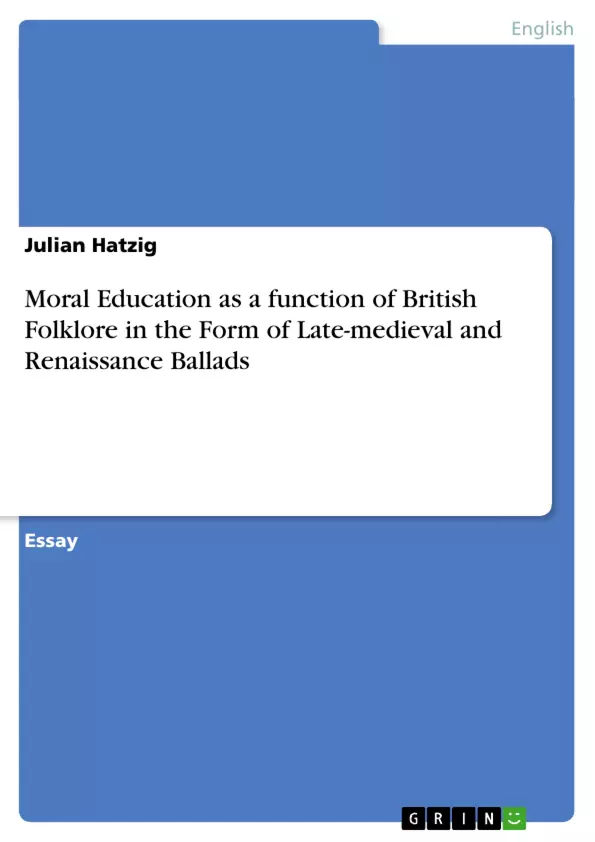I. Introduction
In this Essay I shall argue that one can find aspects of moral education in virtually
every subgenre of late medieval and renaissance ballads and that this is probably
one of the main functions for the spreading of the ballads. Despite the fact that
there are no real fixed and approved subgenres of ballads, I am going to divide the
ballads I am working with into three different subgenres: religious ballads,
supernatural ballads and romances, or to be precise, romance ballads. For each
subgenre, I will present examples, which share common motifs of late medieval
and renaissance ballads and can therefore be marked as traditional ballads from
that specific period. Subsequently, I am going to emphasise on the particular
aspect of moral education in the discussed ballad. Even though the content of
most ballads is not bound to a specific country, respectively culture, but can be
identified in various versions all over the world, mainly Europe and the United
States, I will concentrate on the British versions of particular ballads, taken from
“The Oxford Book of Ballads” edited by James Kinsley and published in 1970.
Inhaltsverzeichnis (Table of Contents)
- I. Introduction
- II. Moral Education in Late medieval and Renaissance Ballads
- II. 1 Religious Ballads
- II. 2 Supernatural Ballads
Zielsetzung und Themenschwerpunkte (Objectives and Key Themes)
This essay aims to demonstrate the presence of moral education within late medieval and renaissance ballads, arguing that this function was central to their widespread distribution. The essay examines three subgenres of ballads: religious, supernatural, and romance ballads.
- Moral education in late medieval and renaissance ballads
- The role of ballads in shaping societal values and beliefs
- The use of traditional ballad motifs to convey moral messages
- The influence of oral tradition and folklore on ballad content
- The comparison of ballad themes across cultures and historical periods
Zusammenfassung der Kapitel (Chapter Summaries)
The Introduction outlines the argument that moral education is embedded in various late medieval and renaissance ballad subgenres, suggesting it played a crucial role in their dissemination. The essay focuses on three distinct subgenres: religious, supernatural, and romance ballads, analyzing the moral and educational aspects of each.
The section on Religious Ballads delves into the ballad "Dives and Lazarus," highlighting the clear moral message of the story through its depiction of the wealthy Dives' refusal to help the poor Lazarus and subsequent punishment. The ballad serves as a moral lesson for the wealthy, urging them to be generous and charitable.
The section on Supernatural Ballads explores two examples, "The Laily Worm and the Machrel" and "Young Hunting." The former, "The Laily Worm and the Machrel," illustrates the consequences of deception and cruelty, as the stepmother's deceit and malicious actions are punished with death. "Young Hunting," on the other hand, warns against jealousy and violence, showcasing the repercussions of the mistress's murder of Young Hunting and her ultimate punishment.
Schlüsselwörter (Keywords)
The key themes explored in this essay include moral education, late medieval and renaissance ballads, religious ballads, supernatural ballads, traditional ballad motifs, oral tradition, folklore, societal values, and cultural transmission. The essay focuses on analyzing the moral lessons embedded in ballads and their role in shaping and transmitting social beliefs and values within different cultures and historical periods.
What is the main argument regarding moral education in British ballads?
The essay argues that moral education is a core function found in nearly all subgenres of late-medieval and renaissance ballads, contributing to their widespread popularity.
Which subgenres of ballads are analyzed in the essay?
The essay focuses on three specific subgenres: religious ballads, supernatural ballads, and romance ballads.
What moral lesson is taught in the ballad 'Dives and Lazarus'?
It serves as a lesson for the wealthy, illustrating the divine punishment for lack of charity and the importance of being generous to the poor.
What do supernatural ballads like 'Young Hunting' warn against?
These ballads often warn against destructive emotions like jealousy and the severe repercussions of violent acts like murder.
Why is oral tradition significant for these ballads?
Oral tradition allowed these stories and their moral messages to be transmitted and preserved across generations before they were formally collected in books.
Which source was used for the British versions of the ballads?
The primary source used is "The Oxford Book of Ballads," edited by James Kinsley (1970).



